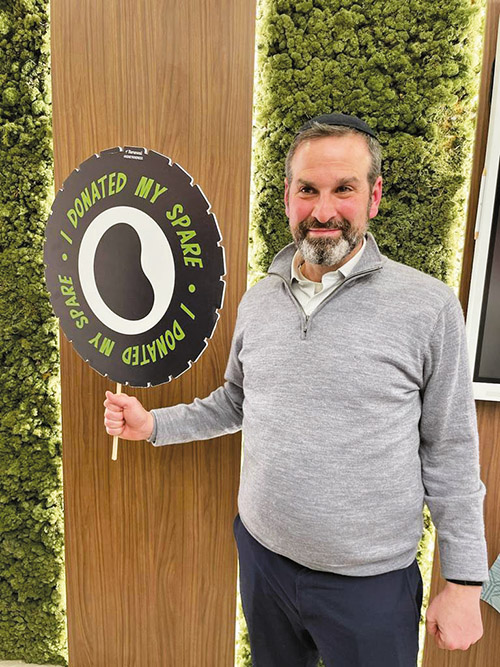
Editor’s Note:
Welcome to The Jewish Link’s inaugural chesed special section. The idea of highlighting and profiling some of our most inspiring organizations and individuals, many “in their own words,” follows along with our December issues which included special sections on gifts and giving. As always, we are very proud to highlight the wonderful, selfless work of these community partners, initiative sponsors and Israel-based organizations who do a great deal of good on behalf of our community. We hope you will be generous with your support and encouragement of these chesed leaders.
On December 22, Riverdale’s Rabbi Jonathan Kroll, principal of SAR High School, arrived at Mount Sinai Hospital to participate in Renewal’s life saving kidney donation program. Kroll posted on Instagram, “Hashem gave me two kidneys. Someone else needs one, might as well give it to him.”
Kroll told The Jewish Link he reached out to Renewal “because I knew some friends who had given kidneys; I was familiar with the organization.” Kroll continued, “I was teaching a class on halachot of organ donation. In doing research for the class, it became clear that there was [the] serious halachic opinion that if you’re able to save someone’s life by giving a kidney, you really should do so.” This opinion stuck with him. Sharing this with his class, “I felt I should do it; it’s the right thing to do. I was very inspired by the people who run Renewal, an organization saving people’s lives, relying on people healthy enough to give up a kidney.” He described his family’s reaction as generally supportive, yet a little cautious, making sure health-wise it was nothing to worry about. “Overall, my wife and children felt very proud.”
After his initial email a year earlier, Renewal identified him as a match for someone needing a kidney in August 2022. From September through November, he underwent rigorous testing, and set the date. Kroll detailed, “Renewal is a fantastic organization; they make it easy. They give support; they let you know everything that’s going on. There are no surprises; you know you have an advocate.”
Then, in February, Renewal reached out because the recipient wanted to meet him and his family. “They knew who I was, because on the day of surgery, Renewal posted a video of me on their Instagram page saying I was excited about giving my kidney. Following the ‘breadcrumbs’ online, they figured out who I was.” Meeting at Renewal’s office, the recipient, Edward Teran, with his wife, children, grandson, nieces and nephew, finally met the Kroll family, including Kroll’s wife and children.
Teran explained that his own mother lost her mother when she was 6 in the 1918 pandemic. When he was 6, his grandfather, the most important person in Teran’s life, died. “He was my world. I realized my grandson was going to be 6, and here I am with kidney failure on dialysis. I planned, from the beginning, to be on dialysis for no more than one year. Dialysis is awful, because it steals every moment of time. Lucky for me, Renewal came along.”
Teran never thought he would have a relationship with his 6-year-old grandson. He feels he has added more years to his life. Kroll expressed, “He was crying. I was crying. We were hugging each other. It was just very beautiful.”
Kroll received a book of letters from people close to Teran expressing gratitude for his kidney donation. Kroll also received a gift that had been in the recipient’s family for generations. Teran’s great-uncle, an American soldier stationed in Italy before WWII, received two figurines from a Jewish-Italian family, resembling themselves. As Jews were getting worried, they asked the uncle to hold on to them, expecting to find him later. This family was killed in the Holocaust, and the great-uncle brought the figurines home. The great-uncle couldn’t bear looking at the faces on the figurines and gave them to his brother, Teran’s grandfather. Teran stated, “What can I give the rabbi? I can’t pay him for a kidney. I can give him something that has more meaning.” Teran’s wish is for Kroll to pass these figurines to his children and grandchildren; “it should never leave his family.”
Reflecting on this experience Kroll stated, “It feels like both the greatest accomplishment and the simplest accomplishment at the same time. I had two kidneys, I didn’t need both, I gave somebody something I didn’t need. On a certain measure, that is easier than writing a check.”
Kroll continued, “The thing I am losing was of no value to me but is of ultimate value to him.”
Kroll revealed that the first two weeks of recovery were very uncomfortable. Then things started getting better. A month out of surgery, I felt fine. … There is something very thrilling and brings lots of joy to feel like you make such a difference.”
Kroll added, “As an educator, I like to think I make differences in people’s lives. But when you teach, do you really know how many people are listening? This does make a difference. It’s something very gratifying and exciting; giving something to somebody you just know made a difference.”
To anyone interested in donating a kidney, Kroll explained, “The experience is priceless. I feel very grateful being healthy enough to do this. You need a couple of weeks to recover. If you’re OK with that kind of commitment, the reward is you’re genuinely saving a person’s life, a huge mitzvah, and it makes you feel fantastic.”
Teran concluded, on kidney donation, “The truest act of being a human is to save the life of another person, especially in Judaism.”
To learn more about kidney donation and Renewal, visit their website at https://www.renewal.org/









